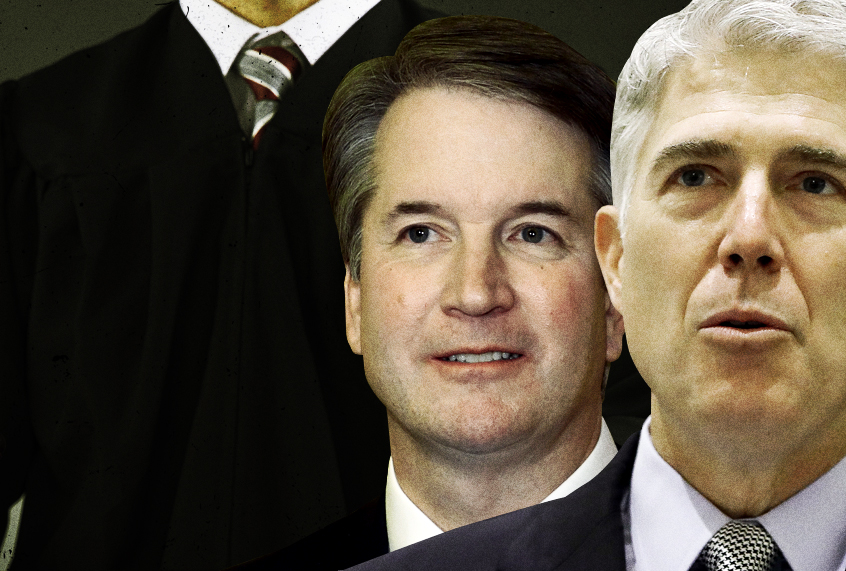For those keeping score, the Trump administration’s Supreme Court justice choices already are paying off.
Justice Brett Kavanaugh got his first (unsigned) chance to protect executive privilege from challenge, and Justice Neil Gorsuch wrote that a decision dissolving a requirement for Commerce Secretary Wilbur Ross to answer questions about adding a census question about immigration status didn’t go far enough.
During his confirmation hearings, Kavanaugh’s made clear that he supports expanded powers for the administration to resist legal challenges. A new Supreme Court order on Monday was a chance for a solidified majority on the court to start doing exactly that.
The decision on Monday was unsigned but reflected a majority on the Court. It shielded Ross, part of the executive branch, from answering lawyers’ questions in a lawsuit challenging his decision to add a citizenship question to the 2020 census form. But the court did allow questions for another official, from the Justice Department, spawning a dissent by Gorsuch and Justice Clarence Thomas that said this differentiation made no sense.
Meanwhile, The Washington Post reported that the Trump administration has sought to bypass adverse lower-court rulingson some of its signature issues by seeking extraordinary relief from a refortified conservative Supreme Court. Attorney General Jeff Sessions and Solicitor General Noel J. Francisco have repeatedly gone outside the usual appellate process to get issues such as the travel ban, immigration and greater authority for top officials before the justices.
The government had asked the court to block questioning of Ross as part of a lawsuit filed by several states, including New York, and civil rights groups. The groups are seeking to stop the administration from adding a citizenship question to the U.S. Census. In all, there are six legal challenges to the question, which Ross announced in March would be added to the survey to help enforce the Voting Rights Act. The states and groups say it will intimidate some from participating and result in an inaccurate census.
News reports suggested that the court’s action makes it unlikely that Ross will have to give a deposition in the case but will allow the suit to go forward, at least for now. The court said it would entertain other objections from the government before the trial, which is scheduled to start Nov. 5 in New York.
The Washington Post added that the order “seemed like an attempt by the court to avoid a 5-to-4 split in its first politically significant action since the addition of new Justice Brett M. Kavanaugh.”
The decision did allow the states to depose acting Assistant Attorney General John Gore, which drew a dissent from Gorsuch and Thomas, who said the distinction the court drew did not make sense. “Respectfully, I would take the next logical step and simply stay all extra-record discovery pending our review,” Gorsuch wrote. “When it comes to the likelihood of success, there’s no reason to distinguish between Secretary Ross’s deposition and those of other officials.”
The states and the groups said Ross should be deposed. He has “offered shifting and inaccurate explanations in his decisional memo and in testimony before Congress” as well as in new documents filed in the case, said a brief filed by the New York Immigration Coalition, the ACLU and others. Democratic lawmakers and immigrant rights groups have blasted the idea of adding the citizenship question. They contend it will make immigrants and their families less likely to fill out the form, leading to a more costly and less accurate census.
Six former census directors and a Census Bureau internal analyst also have said that the question would harm the count. That, in turn, could cost states with large immigrant populations representation in Congress and federal funds distributed on the basis of population.
Ross first said he added the citizenship question at the behest of the Justice Department, which said it was needed to help enforce voting rights. But emails showed that he had been pushing for the inclusion of the citizenship question earlier than that, and the groups and states contend the Justice Department request was a pretext.
In a document filed in response to questions sent by outgoing New York Attorney General Barbara Underwood, Ross acknowledged that he had discussed the issue with former White House adviser Stephen K. Bannon and a Republican secretary of state who has been a leader in anti-immigration efforts. In the document, Ross said he recalled Bannon calling him in Spring 2017 to ask whether Ross would speak to Kansas Secretary of State Kris Kobach about ideas for a possible citizenship question on the Census.
That appears to contradict Ross’s testimony to Congress this year. When asked at a hearing on March 20 whether the president or anyone in the White House had discussed the citizenship question with him, Ross said, “I am not aware of any such.”
We shouldn’t be surprised that the new court majority is off and running on what inevitably will turn into a long run of decisions that favor the administration.
Hey, with a businessman president, we look for a good return on investment.


